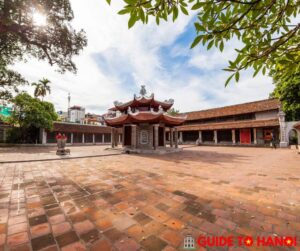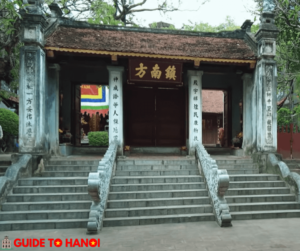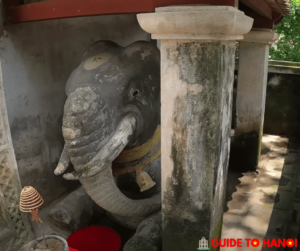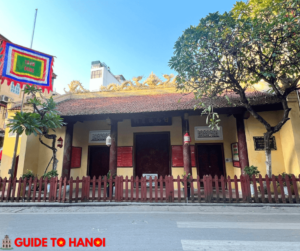One Pillar Pagoda
Ah, the One Pillar Pagoda in Hanoi, Vietnam – a monument inside Ho Chi Minh Mausoleum Complex that stands tall and proud, like the architectural version of a single, sophisticated chopstick in a bowl of cultural noodle soup.
Built in the 11th century by Emperor Ly Thai Tong, this pagoda is the ultimate flex in construction.
I mean, who needs multiple pillars when you can have just one? It’s the OG minimalist design – take note, modern architects!
The Lotus Dream: Birth of One Pillar Pagoda
Legend has it that the emperor Emperor Lý Thái Tông dreamt about receiving a baby from the hands of the Goddess of Mercy, sitting on a lotus flower.
So, naturally, he woke up and decided, “Let’s make a pagoda shaped like a giant flower on a single pillar.” Because why not, right?
So, to express his gratitude, he constructed the extraordinary One Pillar Pagoda in 1049, a temple balancing delicately on a single pillar in the heart of Hanoi’s Ba Đình district.
It might not be the world’s tallest or most elaborate pagoda. Still, the One Pillar Pagoda is like the petite powerhouse of Hanoi – a cultural shot of espresso in a city full of architectural lattes.
Liên Hoa Đài: The Lotus Pedestal
Step into the architectural marvel known as Liên Hoa Đài, or ‘the lotus pedestal.’
With its unique structure, this temple stands proudly atop the single pillar of the One Pillar Pagoda complex.
Built in 1105, it represents Vietnam’s rich history and devotion to Buddhist traditions.
Royal Rendezvous: Annual Vesak Celebration
Join the historical gala as the Lý dynasty hosts an annual royal ceremony at the One Pillar Pagoda during Vesak, celebrating the Buddha’s birthday.
Witness the monarch’s symbolic Buddha-bathing ceremony, accompanied by the release of a bird, creating an unforgettable spectacle in the heart of Hanoi.
Bell of the Turtles’ Field: A Ming Dynasty Tale
Explore the intriguing history of the Chuông Quy Điền, the bell of the turtles’ field, as it embarks on a journey from the Lý dynasty to the Ming dynasty.
Discover how it met its fate during an invasion and was ultimately sacrificed for the cause of Vietnamese freedom.
Dynastic Drama: Destruction and Restoration
Uncover the dramatic tale of the One Pillar Pagoda’s fate during the Nguyễn dynasty.
From dynamite in 1954 to restoration in 1955, witness the resilience of this iconic pagoda as it stands tall against the tests of time, embodying the spirit of Vietnamese culture.
Architectural Alchemy: From Stone Pillars to 3D Dreams
Delve into the fascinating research connecting the One Pillar Pagoda’s architecture to ancient pagodas like Dam and Nhat Tru.
Journey through time as researchers and architects, including Nguyen Hung Vi and Dr. Tran Trong Duong, collaborate to recreate the original marvel through 3D images and virtual reality.
Dragons and Moon: The Nguyen Dynasty’s Artistic Legacy
Marvel at the architectural intricacies of the One Pillar Pagoda today, featuring a square Lien Hoa platform, a lotus palace with a tiled roof, and the symbolic “Two Dragons Flanking the Moon.”
Discover how dragons, symbols of authority and strength, grace the temple, representing divine power and ancient wisdom.
Visit One Pillar Pagoda: Embrace the Unique Heritage
Immerse yourself in the enchanting beauty of Hanoi by visiting the One Pillar Pagoda in the Ho Chi Minh Mausoleum Complex.
Uncover the layers of history, marvel at the unique architecture, and witness the fusion of spirituality and artistry.
Make your journey memorable – let the lotus rise as you explore the heart of Vietnam.
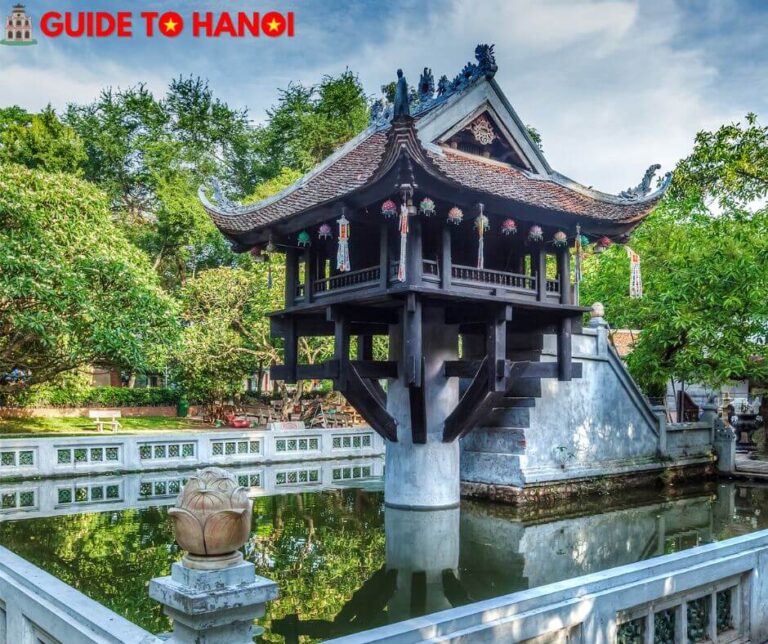
One Pillar Pagoda Summary
| Aspect | Description |
|---|---|
| Location | Ho Chi Minh Mausoleum Complex, Ba Đình district, Hanoi, Vietnam |
| Construction | Built in 1049 by Emperor Lý Thái Tông |
| Unique Feature | Liên Hoa Đài – Temple on a single pillar |
| Historical Events | Vesak celebrations, Ming dynasty invasion, Nguyễn dynasty restoration |
| Architectural Style | Hexagonal lotus tower with symbolic dragons |
| Recent Renovation | Restored in 1955 by the Ministry of Culture of Democratic Republic of Vietnam |
| Recognition | Symbol of Hanoi, Unique architecture in Asia |
Why is One Pillar Pagoda famous?
The One Pillar Pagoda is renowned for its unique architecture, featuring a temple perched delicately on a single pillar, making it an iconic symbol of Hanoi.
What is the legend of the One Pillar Pagoda?
According to legend, Emperor Lý Thái Tông dreamt of receiving a son from the Bodhisattva Avalokiteshvara while seated on a lotus flower. In gratitude, he built the pagoda in 1049.
What is the dress code for the One Pillar Pagoda?
It’s advisable to dress modestly and respectfully, covering shoulders and knees, as a sign of reverence when visiting the pagoda.
How do I get to the One Pillar Pagoda?
The One Pillar Pagoda is inside the Ho Chi Minh Mausoleum in Ba Đình district, Hanoi.
Visitors can use various modes of transportation, including taxis, cyclos, or simply by walking, as it’s situated near the Thăng Long Citadel.
How much does it cost to go to the One Pillar Pagoda?
Entrance to the One Pillar Pagoda is usually free of charge for visitors.
However, there might be optional donation boxes for those willing to contribute to maintaining the pagoda.
How old is the One Pillar Pagoda?
The One Pillar Pagoda was initially constructed in 1049, over a millennium old.
Despite renovations and restorations, it stands as a historical marvel in Hanoi.

